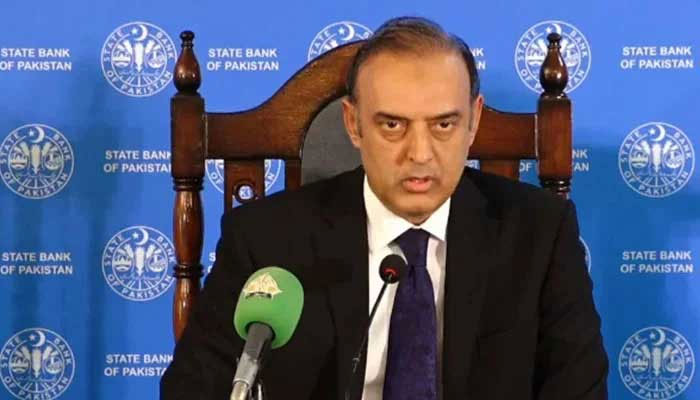Central bank to issue new currency notes, says SBP governor
KARACHI: Pakistan’s central bank is progressing with the issuance of new design currency notes, with the first new banknote expected to be released by the end of this year.
Jameel Ahmad, governor of the State Bank of Pakistan (SBP), shared this information during a media briefing following a monetary policy meeting on Monday. His comments came as the SBP cut its benchmark interest rate by 100 basis points (bps) to 12 per cent.
Ahmad mentioned that the process of issuing new design currency notes is extensive, and a committee is currently working on it. At present, the design of the new notes is pending approval, with the cabinet expected to give its final approval in the next two to three months.
He noted that the release of the new notes would occur in phases but did not disclose which specific denomination would be released first. “All currency notes will be issued gradually, but we are still in the final stages of approval,” he stated.
Regarding the introduction of a central bank digital currency (CBDC), Ahmad said the SBP has been making efforts to introduce a CBDC. A bill to create the necessary legal framework is currently under consideration by the government. The SBP has been studying developments worldwide and learning from the technological frameworks adopted by other countries in regard to digital currency over the past two years.
“We are in the process of strengthening our capacity building, as this is a highly technical subject,” he said. The SBP is focusing on the technological and regulatory requirements and safeguards related to CBDC, which have been implemented by other central banks globally, he explained.
He mentioned that the bill regarding the CBDC is under government consideration. If it is passed, the SBP will take further steps. The SBP plans to implement the CBDC in phases once the groundwork is established.
This month, Pakistan introduced a private member’s bill, the ‘Virtual Assets Bill 2025’, aimed at creating a regulatory framework for the rapidly growing digital asset market, including cryptocurrencies and blockchain technologies. The bill seeks to lay the foundation for a digital rupee, pegged to the Pakistani rupee, under central bank regulations.
When asked if the banking industry would be able to comply with the current deadline set by the 26th Constitutional Amendment bill to eliminate all forms of ‘riba’ (interest) by January 2028, Ahmad responded that the SBP has introduced a Sharia governance framework and auditing process. The SBP is collaborating with the industry and has established a steering committee to provide strategic guidance for converting conventional banks into Islamic banks.
Ahmad noted that while there is high demand for sukuk (Islamic bonds) in the market, the current volume of issuance is very low. The two main types of sukuk in Pakistan are asset-based and asset-backed. The current structure of sukuk is asset-based, which requires the government to have sufficient available assets to collateralise and issue sukuk against them.
“We are reviewing an asset-light sukuk structure, and some countries have shown progress on this,” he disclosed. He also announced that the SBP will soon launch a new platform called Invest Pak, which will allow individuals and corporations to invest directly in government securities. “We are going to launch Invest Pak, whereby the general public and corporations can invest directly in government securities. Testing is currently underway, and the launch will happen soon.”
All individuals and corporations with a bank account will be eligible to open their IPS accounts, enabling them to invest in Pakistan’s government securities. Investments can be made in Treasury bills and Pakistan Investment Bonds through an Investor Portfolio Securities (IPS) account, using funds from their regular bank accounts.
-
 'A Very Special Visitor' Meets Queen Camilla At Clarence House
'A Very Special Visitor' Meets Queen Camilla At Clarence House -
 Jodie Turner Smith Shares One Strict Rule She Follows As A Mom
Jodie Turner Smith Shares One Strict Rule She Follows As A Mom -
 Hailey Bieber Reveals KEY To Balancing Motherhood With Career
Hailey Bieber Reveals KEY To Balancing Motherhood With Career -
 Photo Of Jay-Z, Other Prominent Figures With Jeffrey Epstein Proven To Be Fake
Photo Of Jay-Z, Other Prominent Figures With Jeffrey Epstein Proven To Be Fake -
 Hillary Clinton's Munich Train Video Sparks Conspiracy Theories
Hillary Clinton's Munich Train Video Sparks Conspiracy Theories -
 Fans Slam Talk Show Host For 'cringe' Behavior In Chris Hemsworth Interview
Fans Slam Talk Show Host For 'cringe' Behavior In Chris Hemsworth Interview -
 Woman Jailed Over False 'crime In Space' Claim Against NASA Astronaut
Woman Jailed Over False 'crime In Space' Claim Against NASA Astronaut -
 James Van Der Beek’s Close Pal Reveals Family's Dire Need Of Donations
James Van Der Beek’s Close Pal Reveals Family's Dire Need Of Donations -
 Prince William And Harry's Cousins Attend 'Wuthering Heights' Event
Prince William And Harry's Cousins Attend 'Wuthering Heights' Event -
 Hailey Bieber Turns Heads Just Hours After Major Business Win
Hailey Bieber Turns Heads Just Hours After Major Business Win -
 King Charles' Andrew Decision Labelled 'long Overdue'
King Charles' Andrew Decision Labelled 'long Overdue' -
 Timothee Chalamet 'forever Indebted' To Fan Over Kind Gesture
Timothee Chalamet 'forever Indebted' To Fan Over Kind Gesture -
 Columbia University Sacks Staff Over Epstein Partner's ‘backdoor’ Admission
Columbia University Sacks Staff Over Epstein Partner's ‘backdoor’ Admission -
 Ozzy Osbourne's Family Struggles Behind Closed Doors
Ozzy Osbourne's Family Struggles Behind Closed Doors -
 Dua Lipa Claims Long-distance Relationship 'never Stops Being Hard'
Dua Lipa Claims Long-distance Relationship 'never Stops Being Hard' -
 BTS Moments Of Taylor Swift's 'Opalite' Music Video Unvieled: See Photos
BTS Moments Of Taylor Swift's 'Opalite' Music Video Unvieled: See Photos




